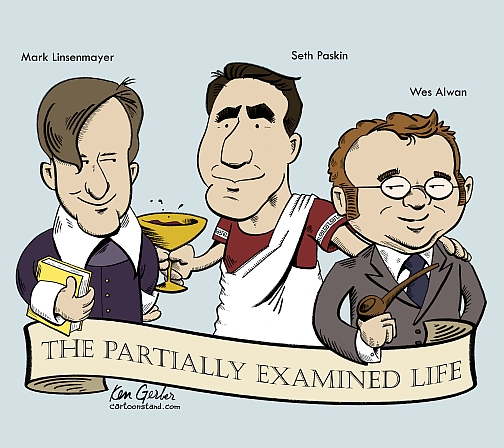According to Socrates, “the unexamined life is not worth living.” According to Camus, once a life is examined and one truly understands its absurdity, one is left with the question: why continue? [See my 2010 blog entry: Why I Don’t Commit Suicide]. Maybe the solution is to have a partially examined life: examining life while keeping one’s wits about it.
Well the good news is a group of witty ex-philosophers have an awesome series that will help you with this process. Their Podcasts are free, and they are AWESOME. Here are links to the first fifty of them, each post with a PDF of the episode’s reading materials. You can also get the Podcasts from iTunes, also for free.
Ep. 1: Plato’s Apology. Part 2.
Ep. 2: Descartes’s Meditations
Ep. 4: Camus: “The Myth of Sisyphus” and “An Absurd Reasoning”
Ep. 5: Aristotle’s Nichomachean Ethics
Ep. 7: Wittgenstein’s Tractatus Logico-Philosophicus, Part 1
Ep. 8: Wittgenstein’s Tractatus, Part 2, plus Carnap
Ep. 9: Utilitarianism: Bentham and Mill
Ep. 10: Kant’s Groundwork of the Metaphysic of Morals
Ep. 11: Nietzsche’s Genealogy of Morals
Ep. 13: Werner Heisenberg’s Physics and Philosophy
Ep. 14: Machiavelli’s The Prince and Discourse on Livy.
Ep. 15: Hegel’s Introduction to the Philosophy of History.
Ep. 16: Arthur Danto’s The Philosophical Disenfranchisement of Art
Ep. 17: Hume’s An Enquiry Concerning Human Understanding
Ep. 18: Plato’s Theaetetus and Meno
Ep. 19: Kant’s Prolegomena to Any Future Metaphysics
Ep. 20: William James’s Pragmatism plus C.S. Peirce
Ep. 21: Essays on mind by Alan Turing, Gilbert Ryle, John Searle, Thomas Nagel, Dan Dennett
Ep. 22: William James’s “The Will to Believe” and more Pragmatism
Ep. 23: Rousseau’s Discourse in Inequality
Ep. 26: Freud’s Civilization and its Discontents
Ep. 27: 2nd century Buddhist Nagarjuna’s Reasoning and Emptiness
Ep. 28: Nelson Goodman’s Ways of Worldmaking
Ep. 29: Kierkegaard’s The Sickness Unto Death
Ep. 30: Schopenhauer’s On the Fourfold Root of the Principle of Sufficient Reason
Ep. 31: Husserl’s Cartesian Meditations
Ep. 32: Heidegger’s Being and Time
Ep. 34: Frege’s “Sense and Reference,” “Concept and Object,” and “The Thought”
Ep. 35: Hegel’s Phenomenology of Spirit
Ep. 36: More Hegel’s Phenomenology of Spirit
Ep. 37: Locke’s Second Treatise on Government
Ep. 38: Bertrand Russell’s Introduction to Mathematical Philosophy
Ep. 39: Friedrich Schleiermacher’s On Religion; Speeches to its Cultured Despisers
Ep. 41: Patricia Churchland’s Braintrust (with her as a guest), plus Hume
Ep. 42: Charlotte Perkins Gilman’s Herland and Carol Gilligan’s In a Different Voice
Ep. 43: J.L. Mackie’s The Miracle of Theism: Arguments For and Against the Existence of God
Ep. 44: Selections on atheism by Sam Harris, Richard Dawkins, Christopher Hitchens, and Dan Dennett.
Ep. 45: Hume’s Treatise of Human Nature, Book III and Adam Smith’s Theory of Moral Sentiments
Ep. 47: Sartre’s Transcendence of the Ego
Ep. 48: Merleau-Ponty’s “Primacy of Perception”
Ep. 49: Foucault’s Discipline and Punish
Ep. 50: Robert M. Pirsig’s Zen and the Art of Motorcycle Maintenance
So go for it: partially examine your life!

Also, if you’re interested in other forms of philosophy-made-accessible, you might like the (free) documentary Examined Life that features interviews with Peter Singer and other big thinkers. And, in case I haven’t mentioned it before today, Alain de Botton does a great series on Philosophy: a Guide to Happiness which was probably my first introduction to philosophy when I borrowed the DVD from Belrose Library sometime in 2006. It’s GREAT.
You know what I really don’t understand: why isn’t Philosophy taught as a subject in high school? One would think that teaching children HOW think rather thank feeding their minds with WHAT to think, might be beneficial for a democratic fast-changing society like ours… Hm… maybe that’s a topic to partially examine some other day.